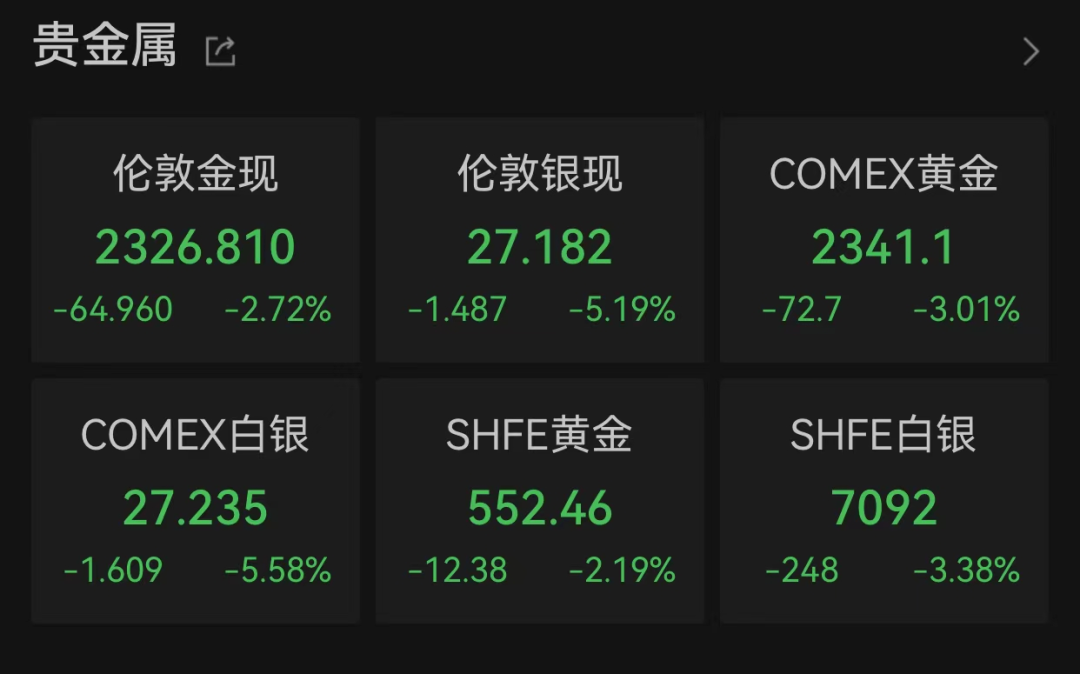Gold plunges nearly 3%, the biggest drop in two years, institutions are still unanimously bullish.
Looking ahead, UBS expects that gold may enter a consolidation period in the short term, but any price correction is an opportunity for investors to increase their holdings of gold. The continuous presence of geopolitical risks may provide support for the gold market in the long term.
April 22nd saw a 2.72% drop in London's spot gold prices, closing at $2,326.810 per ounce, the largest single-day decline in nearly two years; COMEX gold futures fell by 3.01%, closing at $2,341.1 per ounce; COMEX silver futures dropped by 5.58%, closing at $27.235 per ounce.

Analysts attribute the significant drop in gold prices last night mainly to the receding concerns over conflicts in the Middle East. Tehran's stance on the Israeli drone attack incident has softened, and it is believed that Iran is trying to avoid escalating regional tensions. Additionally, the gold price had previously risen to a record high above $2,400 per ounce, creating a dangerous overbought market condition, which is also an important reason for the overnight plunge in gold prices.
However, analysts also believe that investors need to view the gold price trend correctly. Despite a more than 2% drop in gold prices during the early morning of the North American market, they seem to have the opportunity to maintain a level around $2,350 per ounce. "Given the solid fundamentals, any market correction should be seen as a buying opportunity."
Analysts have provided three main reasons. First, the factors driving the gold price to break through still exist, with central banks continuing to purchase gold as a safe-haven asset to hedge against rising debt levels and US dollar risks. Second, Asian investors continue to diversify their investment portfolios in the market, continuously providing upward momentum for gold. Finally, for investors who initially missed the rebound opportunity, a drop in gold prices to the $2,330 or $2,300 level may be a solid entry point.
On the institutional side, there is also a consensus on being bullish on gold.
Nicky Shiels, Head of Metals Strategy at MKS PAMP, stated that despite the recent potential for gold prices to fall, she still maintains a target price of $2,500 per ounce. She said, "No (news) bad news is bad news for gold and silver bulls. Although geopolitical (or US dollar or interest rate) factors are not the primary reasons for the rise in gold prices, the war premium has not been removed."
David Morrison, Senior Market Analyst at Trade Nation, indicated that there is a possibility for gold prices to decline, but he pointed out that previous pullbacks have proven to be good buying opportunities. When precious metals have experienced gains over the past 10 weeks, selling can be severe but also quite short-lived. Despite this, both metals are still far above any significant support levels. The question is whether the prices will retest or simply surge regardless.
Chantelle Schieven, Chief Researcher at Capitalight Research, was the most optimistic in her gold price forecast for this year at the London Bullion Market Association. She said that gold prices may fall to $2,150 per ounce this summer; however, she added that she expects gold prices to break through $2,500 per ounce by the end of the year, higher than her previous target of $2,400 per ounce, which has already been reached.
Senior gold analyst Mark Mead Baillie also stated that gold is very overbought in the short term but still significantly undervalued in the long term. Given that the IMF recently mentioned again that "US debt levels are unsustainable" and will have a global impact, something "has to give," so the recent negative perception of gold may not make sense in the long run.
Looking ahead, UBS expects that gold may enter a consolidation period in the short term, but any price correction is an opportunity for investors to increase their holdings of gold. The continuous presence of geopolitical risks may provide support for the gold market in the long term.
·Original
Disclaimer: The views in this article are from the original Creator and do not represent the views or position of Hawk Insight. The content of the article is for reference, communication and learning only, and does not constitute investment advice. If it involves copyright issues, please contact us for deletion.